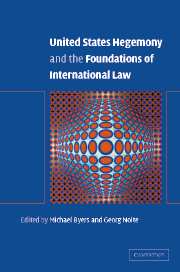Book contents
- Frontmatter
- Contents
- List of contributors
- Preface
- Introduction: the complexities of foundational change
- PART I International community
- PART II Sovereign equality
- PART III Use of force
- PART IV Customary international law
- 10 Powerful but unpersuasive? The role of the United States in the evolution of customary international law
- 11 Hegemonic custom?
- 12 Comments on chapters 10 and 11
- PART V Law of treaties
- PART VI Compliance
- Conclusion
- Index
11 - Hegemonic custom?
Published online by Cambridge University Press: 13 July 2009
- Frontmatter
- Contents
- List of contributors
- Preface
- Introduction: the complexities of foundational change
- PART I International community
- PART II Sovereign equality
- PART III Use of force
- PART IV Customary international law
- 10 Powerful but unpersuasive? The role of the United States in the evolution of customary international law
- 11 Hegemonic custom?
- 12 Comments on chapters 10 and 11
- PART V Law of treaties
- PART VI Compliance
- Conclusion
- Index
Summary
This chapter examines some elements of post-1990 customary practice, not for the purpose of presenting this practice exhaustively, but rather to focus on the relationship between hegemonic power and the customary system of rules. It concludes that, a decade after the end of the Cold War, the primary rules of customary international law have not undergone any dramatic change as a consequence of the dominant position of the United States in the international system. Hegemony finds its expression, not in the abrupt transformation of the international legal order, but in the incidental infiltration of concepts, the “flexibilization” of custom, the maximization of the discretionary powers of policy makers and the increased impact of society on opinio necessitatis.
The United States, in order to “set the agenda,” needs to coordinate its activities with those of other States possessing strategic positions within international decision-making structures. Correspondingly, and without prejudice to the possibility of persistent objection, the missing uniformity of state practice can be supplemented by the psychological element of the opinio necessitatis of international society. If we consider the transnational society of non-state actors to be an integral part of the present-day international community, then its contribution to the opinio necessitatis should be extended to custom in general. The “normative strength” of that contribution will depend on the issue and circumstances “giving birth” to a new rule.
- Type
- Chapter
- Information
- United States Hegemony and the Foundations of International Law , pp. 317 - 347Publisher: Cambridge University PressPrint publication year: 2003
- 2
- Cited by

